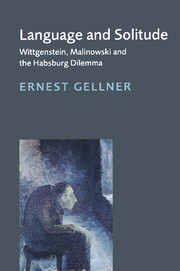Book contents
- Frontmatter
- Contents
- Preface
- Foreword
- Part I The Habsburg dilemma
- 1 Swing alone or swing together
- 2 The rivals
- 3 Genesis of the individualist vision
- 4 The metaphysics of romanticism
- 5 Romanticism and the basis of nationalism
- 6 Individualism and holism in society
- 7 Crisis in Kakania
- 8 Pariah liberalism
- 9 Recapitulation
- Part II Wittgenstein
- Part III Malinowski
- Part IV Influences
- Part V Conclusions
- General bibliography
- Bibliographies of Ernest Gellner's writings on Wittgenstein, Malinowski, and nationalism
- Index
1 - Swing alone or swing together
Published online by Cambridge University Press: 05 March 2010
- Frontmatter
- Contents
- Preface
- Foreword
- Part I The Habsburg dilemma
- 1 Swing alone or swing together
- 2 The rivals
- 3 Genesis of the individualist vision
- 4 The metaphysics of romanticism
- 5 Romanticism and the basis of nationalism
- 6 Individualism and holism in society
- 7 Crisis in Kakania
- 8 Pariah liberalism
- 9 Recapitulation
- Part II Wittgenstein
- Part III Malinowski
- Part IV Influences
- Part V Conclusions
- General bibliography
- Bibliographies of Ernest Gellner's writings on Wittgenstein, Malinowski, and nationalism
- Index
Summary
There are two fundamental theories of knowledge. These two theories stand in stark contrast to each other. They are profoundly opposed. They represent two poles of looking, not merely at knowledge, but at human life. Aligned with these two polar views of knowledge, there are also related, and similarly contrasted, theories of society, of man, of everything. This chasm cuts right across our total social landscape.
In order to seize the gist of this deep and general confrontation, it is perhaps best to begin with knowledge. In this field the contrast is particularly stark and has a sharp profile.
There is, first of all, what one might call the individualistic/atomistic conception of knowledge. Knowledge, on this view, is something practised or achieved above all by individuals alone: if more than one person is involved, and collaboration takes place, this does not really modify the essence of the activity or of the achievement. In principle, the acquisition of knowledge is something open to Robinson Crusoe, and perhaps to him especially. It is our suggestibility and gullibility, especially in youth, perhaps our desire to please and conform, which above all leads us into error. We discover truth alone, we err in groups.
Crusoe's isolation saves him from following a multitude to commit folly. He is spared the worst temptation to err – conformism. Mutual aid may advance an inquiry, but it does not affect its character. Knowledge is a relationship between an individual and nature. Society, its hierarchy and its customs may sometimes be of help; but rather more often they constitute a hindrance.
- Type
- Chapter
- Information
- Language and SolitudeWittgenstein, Malinowski and the Habsburg Dilemma, pp. 3 - 6Publisher: Cambridge University PressPrint publication year: 1998

